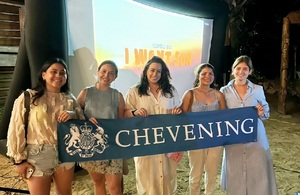Chevening Alumni address waste management and pollution at rivers and the Caribbean Sea
Chevening alumni from Guatemala and Honduras organized a roundtable discussion and a documentary screening to discuss solutions to environmental challenges.

Professionals from various disciplines led a roundtable discussion in Roatán, Honduras, on January 9, 2025. The event sought to address structural challenges related to river and sea pollution, as well as solid waste management in Guatemala and Honduras.
The forum, which took place at the Infinity Bay Hotel, brought together key representatives, including the Honduran Private Enterprise Council (COHEP), the Honduran Chamber of the Construction Industry (CHICO), the Honduran Sugar Association (AHPA), researchers Zara Zúñiga and Sandra Cárdenas, and local organizations such as the Bay Islands Conservation Association (BICA), Sustenta Honduras, and SOA Honduras. Community leaders from Roatán and representatives from municipalities and civil society with experience in environmental diagnosis and community management also participated.
The topics discussed were:
- Transboundary challenges in the Motagua River basin, which divides Guatemala and Honduras, identifying the negative impacts of pollution on marine ecosystems.
- The inadequate disposal of solid waste, especially plastics and toxic waste, which affects both local communities and water resources.
- The circular economy as a sustainable alternative, including current barriers to implementing biodegradable packaging and increasing recycling rates.
- The need to strengthen regulations in Honduras and Guatemala, addressing problems such as slow administrative procedures, lack of resources, and absence of effective enforcement mechanisms.
On January 10, 2025, a screening of the documentary “Quiero Sol” (I Want Sun), directed by Honduran filmmaker Manlio Martínez, was organized in collaboration with local partners at the Blue Bahia Beach Grill.
This documentary highlighted the risks facing the Honduran reef due to pollution and climate change, and generated reflection among the more than 50 attendees, including members of the public sector, the local community, and national and international participants.
During the subsequent discussion, attendees stressed the importance of spaces organized by the Chevening Network to connect people interested in implementing positive changes and protecting the ecosystem, considered a common heritage and home to local communities.
Some of the conclusions of this dialogue included:
- Clear environmental impact: There is sufficient scientific evidence on the damage caused by river pollution in the Honduran Caribbean ecosystem, affecting marine biodiversity and putting the region’s economy at risk due to the possible collapse of coral reefs.
- Lack of prioritization and resources: The absence of priority government attention has resulted in weak application of regulatory policies and a lack of resources to implement them effectively.
- Participation of academia: The inclusion of academic institutions is key to designing solutions based on scientific evidence, developing innovative alternatives, and building technical capacities to address waste management challenges.
- Commitment to collaboration: Despite the barriers, actors, including representatives of the private sector, demonstrated a willingness to work together, and promote sustainable solutions.
The event concluded with a call to strengthen cooperation between public, private, community, and academic sectors, as well as between countries, to address the challenges in a comprehensive manner. The Chevening Associations deeply appreciate the active participation of all attendees, who with their experience and commitment enriched this dialogue in favour of a more sustainable future.
About the Chevening Associations
The Chevening Alumni Associations bring together outstanding professionals who have obtained the prestigious Chevening scholarships from the United Kingdom, promoting leadership and international cooperation.
About Chevening Scholarships
Chevening Scholarships are an international scholarship programme funded by the UK’s Foreign, Commonwealth and Development Office (FCDO) and partner organisations. These scholarships offer students from around the world the opportunity to undertake a one-year fully funded master’s degree in the UK. Scholars are selected for their leadership potential and commitment to creating a better world.